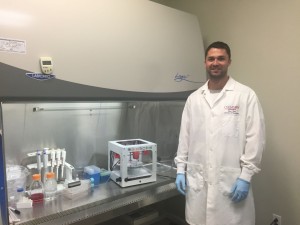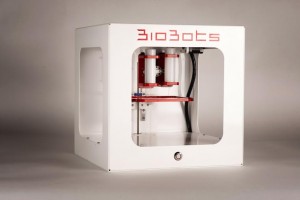Timothy Olsen, a 2012 TCNJ alumnus, is at the forefront of 3D bioprinting, thanks to the CBS news program “60 Minutes” and his biomedical engineering senior project at TCNJ.
Bioprinting is a process that focuses on identifying critical structural and compositional elements of human cells or tissue that can be replicated through an intricate designing tool, or bioprinter, in a controlled laboratory environment. “Think about your desktop printer you have at home. Instead of a printer that prints with black ink, it prints living tissues out of human cells,” Olsen explained. “The cartridge contains a combination of cells and bio materials.”
Directing daily lab operations at BioBots, a bioengineering company producing and innovating bioprinting technology, Olsen leads a team of Bio Ink engineers who create tissue needed for production and assimilation. “We’re accelerating the pace of regenerative medicine,” Olsen said about BioBots.
For Olsen, pursuing a career in bioengineering wasn’t always the obvious choice. Initially registered as a biology major, Olsen made the switch to biomedical engineering prior to his freshman year, but he still wasn’t sure what field of engineering interested him the most – that is, until a special CBS “60 Minutes” aired.
“I was watching a ‘60 Minutes’ where soldiers were coming back from the battlefield with damaged organs and limbs,” Olsen recalled. “They were figuring out ways to regenerate them [organs]. I knew then I was in the right department.”

Throughout his years in the School of Engineering, Olsen never forgot this “60 Minutes” segment and pursued his interest in bioengineering. For his senior project, he worked on a team developing tissue fabrication. The project’s goal: to make material that contains cells and help prepare and regenerate different tissues in the body. “The Senior Project really exposed me to the design process,” Olsen said. “Learning to review content in scientific papers… guided me in the direction to pursue graduate school research.”
Olsen and his team worked with Karen Yan, Associate Professor of Mechanical and Biomedical Engineering. “It [senior project] took so much time, but it was so much fun,” Olsen explained. “There were a lot of long nights, a lot of good friendships, good networking opportunities… it was really exciting for me.”
Gaining basic research experience from his senior project, Olsen regrets not getting involved in more research opportunities as an undergraduate. He advises students to get involved in research to gain valuable experience applicabe to their future careers. “There’s a ton of opportunities out there that people don’t take advantage of,” Olsen noted. “The earlier you get involved the better, because it helps you stand out. It gives you more experience when you want to apply to [graduate] schools.”
After earning a bachelor’s in biomedical engineering from TCNJ, Olsen earned his masters and PhD in bioengineering at Clemson University in South Carolina. In his opinion, participating in research projects not only allows students to stand out as a potential graduate school or employee candidates, but it also allow students to discover what type of research they enjoy conducting. “Research projects guides your interests and passions,” Olsen added. “If you want to go into a field of science, you need research experience.”
Research is especially important in the up-and-coming world of 3D printing, which is still relatively new, according to Olsen. Since the arena of regenerative medicine is recent, there are always developing technologies that produce breakthroughs in research and application. “There’s room to grow. It [regenerative medicine] is growing very quickly,” said Olsen.

This field of bioengineering is particularly significant to Olsen, because the main objective is to translate therapeutic solutions of lost tissue and organs that affect real patients who are suffering. “This technology developed is giving new options and therapies to patients who didn’t really have any hope before,” Olsen said. “That’s what drew me – that’s what exciting for me.”
Olsen encourages students to look into the world of 3D bioprinting. He also looks forward to the new research and laboratory opportunities that will soon be available to TCNJ students in the new STEM building on campus.
Whether students pursue their engineering interests in the emerging fields of bioengineering, or electrical, mechanical, civil, or computer – hard work “forever pays” and “there is a light at the end of the tunnel,” reassured Olsen. “This is true at any level – undergraduate, intern, or professional… if you put in effort, you’re going to be first in line. Personally, I know it’s not easy to get through an engineering career – keep working and it will pay off.”
